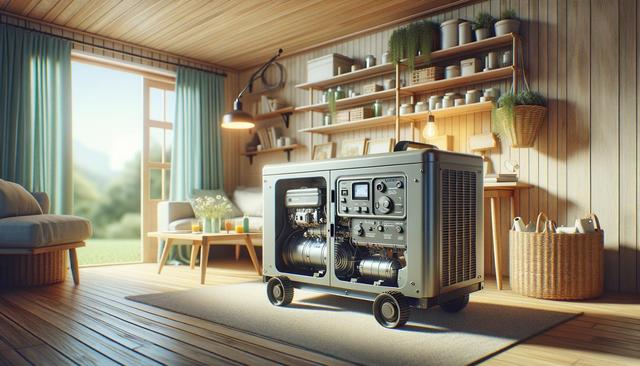Why Home Generators Are Becoming Essential
With weather patterns becoming more unpredictable and infrastructure aging in many areas, power outages are no longer rare occurrences—they’re increasingly common. This shift has made home generators not just a luxury, but a practical investment for homeowners. A reliable generator ensures vital systems like heating, cooling, refrigeration, and medical equipment continue functioning during blackouts. In areas prone to storms, hurricanes, or grid overloads, many homeowners are turning to backup power solutions to maintain daily comfort and safety.
The appeal of home generators extends beyond emergency preparedness. For people working remotely, a generator can prevent disruption during critical meetings or deadlines. Families with young children or elderly members especially benefit from uninterrupted access to electricity. As energy reliability becomes a growing concern, more homeowners are evaluating the role generators can play in offering peace of mind during uncertain conditions.
Types of Generators for Residential Use
There are two main categories of home generators: portable and standby. Each type serves distinct needs, and understanding their differences can help you decide which is appropriate for your home. Portable generators are typically less expensive and offer flexibility, as they can be moved and used in various locations. However, they need to be manually started and connected to appliances or circuits.
Standby generators, on the other hand, are permanently installed outside the home and connect directly to the electrical system. They activate automatically when a power outage occurs, providing seamless operation. These systems are often powered by natural gas or propane and are designed to supply electricity to the entire home or specific circuits. Key considerations when choosing a generator include:
- Power output (measured in watts)
- Fuel type and availability
- Noise level during operation
- Installation and maintenance requirements
The right choice depends on your energy needs, budget, and how often you expect outages to occur.
Features That Enhance Generator Performance
Modern home generators come with a variety of features that improve usability and performance. For instance, many models now include automatic transfer switches, which instantly switch your power source from the grid to the generator during an outage. This eliminates the need for manual intervention and ensures a smooth transition.
Some units offer remote monitoring through smartphone apps, allowing homeowners to check fuel levels, maintenance alerts, or runtime statistics. Other helpful features include:
- Electric start for easier operation
- Fuel efficiency modes to reduce consumption
- Low-oil shutoff to protect the engine
- Weather-resistant enclosures for outdoor durability
These added functionalities can significantly enhance convenience and reduce maintenance, making long-term ownership more manageable.
Highly Regarded Models and Market Trends
As demand for home generators grows, certain models have gained a reputation for reliability and performance. While it’s important to assess your specific requirements, some units consistently receive positive feedback from users for their durability and ease of use. These models often offer a balance of power capacity, fuel efficiency, and low maintenance needs.
Consumer preferences are also shifting toward generators that support cleaner energy. Propane-powered units are gaining traction for their lower emissions compared to gasoline-powered alternatives. Additionally, dual-fuel options provide flexibility, allowing users to switch between fuel sources based on availability and cost. As technology advances, solar-powered backup systems are also emerging, although they currently serve more as supplementary solutions rather than full replacements for traditional generators.
Recent trends indicate a growing interest in whole-home coverage, particularly in regions prone to extreme weather or frequent outages. Homeowners are increasingly willing to invest in systems that offer uninterrupted power to all essential appliances and systems.
Installation, Maintenance, and Safety Considerations
Proper installation is crucial to ensure a home generator functions safely and effectively. Standby generators typically require professional installation, including electrical connections and potentially gas line hookups. It’s important to adhere to local codes and permit requirements during setup. Portable generators, while easier to install, must be used with care to avoid risks like carbon monoxide buildup.
Routine maintenance extends the life of your generator and ensures it’s ready when needed. This includes checking oil and filter levels, running test cycles, and inspecting spark plugs. Many manufacturers recommend an annual professional inspection, especially for standby units.
Safety should always be a top priority. To minimize hazards:
- Never operate a portable generator indoors or in enclosed spaces
- Use heavy-duty extension cords rated for outdoor use
- Keep generators dry and shielded from rain or snow
- Install carbon monoxide detectors in your home
By following these guidelines, you can ensure your generator remains a reliable and safe backup power solution.
Summary: Empowering Your Home with Reliable Backup Power
As the frequency of power outages increases, more homeowners are turning to generators to keep their households functioning smoothly during emergencies. Choosing the right generator involves understanding your power needs, evaluating different types, and considering features that enhance performance. Whether you opt for a portable or standby model, a well-maintained generator can offer dependable protection against unexpected outages. By investing in a solution tailored to your home, you gain the confidence that comes with continuous power—no matter the circumstances.




Leave a Reply